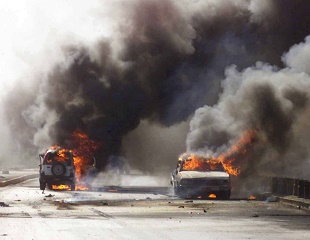Whilst the general populace looks upon the current unrest and atrocities in Iraq, the financial markets are reacting, not with the horror of the general public, but with concern about the potential value of their investments. In no way do I mean to make this sound like the financial world has no heart. I am, rather, saying that it has different concerns.

The major concerns seem to be centered around the continued supply of Iraqi oil. Without a doubt, this concern is not only legitimate concerning the current instability, it is also valid considering the amount of wealth invested in the oil and gas production sector in both Iraq and the surrounding areas.
Reports as of this time indicate that oil continues to flow relatively unabated in the south because the conflict has flowed over the Syrian border into the northern regions of Iraq and has been moving generally southward toward the city of Baghdad, skirting the independent Kurdish region to the far north. So as the current situation stands, there has yet to be an actual threat to disrupting the flow of oil, but the potential remains, and the oil producers are getting ready to implement contingency plans that they have wisely had in place for such a time as this. Outside of the borders of Iraq, the Indian government has asked state-controlled refiners to be ready to do the same.
Could Any Good Come Out of This?
This could be construed as heartless, but as I said earlier, this is about the financial markets, not about humanitarian and emotional issues. Despite President Obama’s pledge to not put boots on the ground, he has put 550 boots on the ground that we are aware of. In addition, he has beefed-up the U.S. naval presence in the Persian Gulf, including carriers with advanced strike weaponry. Given the severity of the Iraqi situation, it is fair to expect a collaborative effort to bring the violence to an end. That is, typically, easier said than done.
Were the situation to escalate to an all-out conflict, or even in preparation for that potential scenario, all of those companies in the defense sector should experience a windfall of incremental military sales, from bombs to body armor and from helicopters to hand grenades.
From a strictly financial perspective, we might expect to see an increase in share prices in the defense sector.
Another Sector That Could Benefit
Anyone with a high school education knows that war always benefits the construction industry. Conflict destroys all kinds of infrastructure, including water supply and waste water disposition, communication lines and towers, roads, bridges and buildings. The major construction firms, all the usual suspects, will be in on the action before you can say, “Show me the money.”
Being aware of just this much may provide some discernment about how to control your investments in an otherwise unstable situation.


 Hot Features
Hot Features













